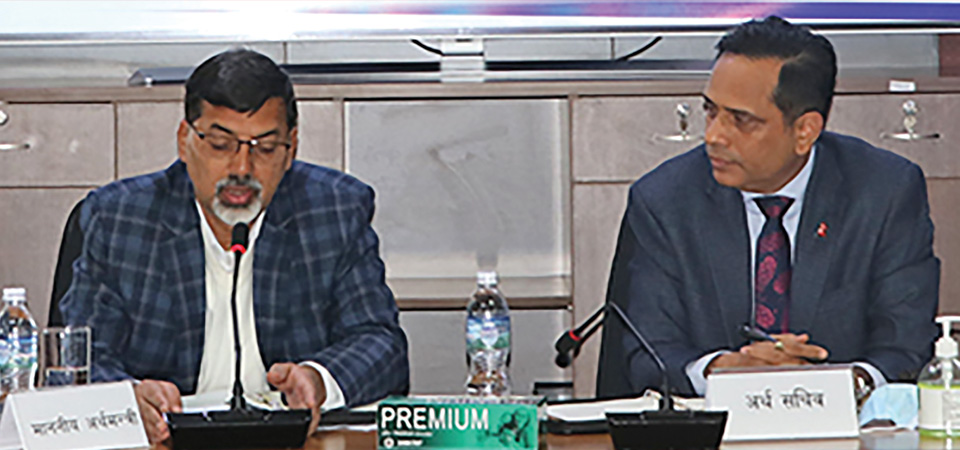Accept land with no road link as collateral: FM

By A Staff Reporter
Kathmandu, Nov. 13: Finance Minister Janardan Sharma has urged the Banks and Financial Institutions (BFIs) to accept the land that is not connected to the road as collateral for loan mobilisation.
In a discussion with the Governor of the Nepal Rastra Bank Maha Prasad Adhikari, chief executive officers and representatives of the commercial banks at his office on Friday, he requested them to help the farmers to get loan by accepting their land not connected to the road.
Stating that the current policy of accepting only the land connected to the motorable roads as the collateral has barred poor farmers from obtaining loans from the banks, he said, "Banks need a 10-feet motorable road to mobilise loans. You don't accept the land that grows walnuts. You should consider accepting the collateral based on agriculture for the agricultural loans."
Indicating the banks were in the situation to meet the loan mobilisation limit, FM Sharma requested them to conduct study on the sector loan flow.
"Banks should monitor the investment of the loans mobilised by them and regularly update the statistics about it. When banks update this statistics, it would help them in loan mobilisation," said the Minister.
He also said that timely policy amendments should be made if banks are unable to disburse the loans.
FM Sharma said that there was no special reason for the liquidity crisis in the financial system and maintained that the situation was under control.
"Current crisis should be resolved for the short term by increasing capital expenditure of the government and managing the foreign resource," he said.
According to him, if the capital is mobilised to the productive sector, most of the problems would be automatically solved. Banks should be strict in disbursing loan to the unproductive sectors.
Finance Secretary Madhu Kumar Marasini said that the solutions proposed by the banks to transfer the local bodies' money to the commercial banks would not help to improve liquidity situation.
"There is not a sizable amount of money as you have been thinking. You can help to lower the liquidity crisis by restricting the loan to the unproductive sector," he said.
President of Nepal Bankers' Association, Anil Kumar Upadhyaya, said that the government could help in resolving the problem of liquidity shortage by increasing the capital expenditure.
According to him, other measures for solution include brining foreign loan and grant at the earliest and depositing money of the local bodies and government corporations in the commercial banks.
Recent News

Do not make expressions casting dout on election: EC
14 Apr, 2022
CM Bhatta says may New Year 2079 BS inspire positive thinking
14 Apr, 2022
Three new cases, 44 recoveries in 24 hours
14 Apr, 2022
689 climbers of 84 teams so far acquire permits for climbing various peaks this spring season
14 Apr, 2022
How the rising cost of living crisis is impacting Nepal
14 Apr, 2022
US military confirms an interstellar meteor collided with Earth
14 Apr, 2022
Valneva Covid vaccine approved for use in UK
14 Apr, 2022
Chair Prachanda highlights need of unity among Maoist, Communist forces
14 Apr, 2022
Ranbir Kapoor and Alia Bhatt: Bollywood toasts star couple on wedding
14 Apr, 2022
President Bhandari confers decorations (Photo Feature)
14 Apr, 2022











